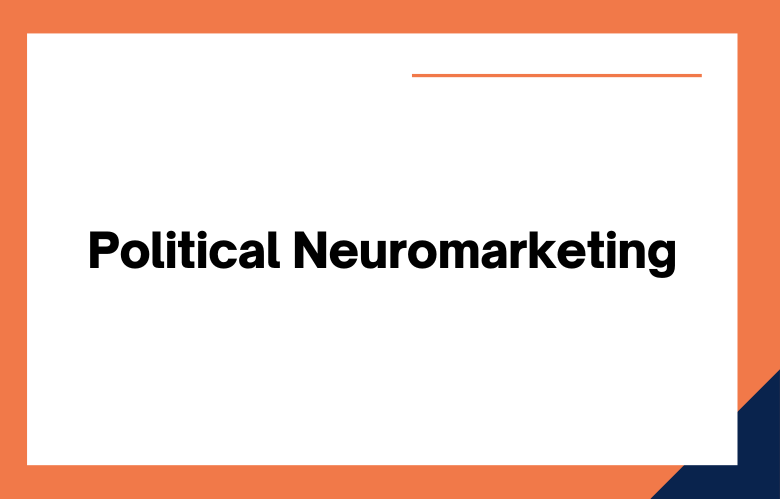As political campaigns become more innovative, they increasingly utilize Neuromarketing, which uses brain scanning and psychological research to analyze voters’ responses to ads and other campaign materials.
The goal is to ensure that these materials effectively trigger voters’ desired emotions and responses, such as excitement, trust, and loyalty to the candidate.
However, this practice also raises concerns about whether or not our brains can be manipulated by this technique, especially when it comes to political decision-making.
We will explore the concept of political Neuromarketing, its use in modern-day campaigns, and its potential consequences.
What is Political Neuromarketing?
Political Neuromarketing studies how the brain processes and responds to political messages.
While neuromarketing studies how the human brain responds to marketing stimuli, political neuromarketing is a relatively new area of study specifically focused on politics.
Although the concept of using brain scanning technology to study political preferences dates back to the early 2000s, political Neuromarketing has gained immense popularity recently, thanks to the advent of digital platforms and political ads.
How Political Neuromarketing Works?
Political Neuromarketing uses various techniques to understand how the brain responds to political messages.
This includes but is not limited to functional magnetic resonance imaging (fMRI), which scans the brain for a specific activity, and eye-tracking, which studies eye movement and dilation.
Electroencephalography measures electrical activity in the brain.
Understanding Political Neuromarketing – What Is It?
Political Neuromarketing is a relatively new concept combining neuroscience with marketing to analyze how our brains react to stimuli, such as specific images, words, or sounds.
Political analysts can use fMRI (Functional Magnetic Resonance Imaging) technology or EEGs (Electroencephalography) to record activity patterns linked to emotions like trust, fear, and anger.
This information can then be used to tailor political campaigns to elicit the desired responses from voters.
Understanding Political Neuromarketing: How Politics Affect Our Brain?
Politics is a topic that can often stir up intense emotions and cause people to make decisions they would otherwise not make.
As the world becomes more interconnected, the study of political Neuromarketing has become crucial in understanding how the brain processes and responds to political messages.
We will discuss political Neuromarketing, how it works, and the implications of this field on politics and society.
The Use Of Political Neuromarketing in Political Campaigns?
Prominent global campaigns already use political neuromarketing techniques, including in the 2016 US Presidential Election.
This field offers new insights into how voters’ brains respond emotionally to various messages and images, allowing them to be more effectively targeted.
Campaign strategists and teams can analyze how people react to news and images at conscious and subconscious levels and then tweak messaging to elicit positive responses.
Potential Consequences of Political Neuromarketing?
Political Neuromarketing can have unintended consequences that directly affect our democratic process.
Such tactics could create polarizing effects by triggering specific emotional responses in each political party.
This could lead to further political polarization and the dividing of the public into opposing camps.
Political Neuromarketing could create morally dubious results by deploying techniques that manipulate voters’ emotions and decision-making.
Political campaigns must continue to use Neuromarketing ethically. Otherwise, it may delegitimize the political process and cause long-term harm to democracy.
Implications of Political Neuromarketing on Politics and Society?
Political Neuromarketing can have profound implications on politics and society as a whole. Understanding how the brain responds to political messages and stimuli can help political parties craft their message to create a more lasting impact.
It can enable candidates to study their competition, choose the right words and colors, and ultimately craft messages that resonate with the audience.
However, there are also concerns about the ethical implications of such practices. Some believe that political Neuromarketing raises severe privacy and ethical considerations.
They argue that politicians are manipulating our thoughts, and more worryingly, they could use such methods to manipulate our decision-making abilities.
The Rising Trend of Political Neuromarketing – A Game-Changer in Politics?
In recent years, a new trend has emerged in politics – neuro-marketing! This technique is a sub-field of market research that uses brain imaging, eye-tracking, and biometric measurements to study voters’ cognitive and affective responses to political campaigning strategies.
With the help of advanced technology, politicians can tailor their campaign messages to different audiences, predict responses, and even influence the voters’ decisions.
But what are the ethical implications and impact of this method on democracy? It looks closely at political Neuromarketing and explores its potential consequences.
Political Neuromarketing is a relatively new phenomenon, and its use in election campaigns is still in its early stages. However, its potential to impact political campaigning is enormous.
The technology allows politicians to measure the unconscious and conscious responses of typically bias-free voters to different messages, suggesting that they can predict voters’ ideology and sway the undecided.
Brain-scanning technology helps politicians create a more personal connection with voters by developing and promoting more relevant political messages.
The Future of Political Neuromarketing?
The neuromarketing industry is in its early stages, but with continuous advancements in neuroscience, it will likely become more refined and sophisticated.
New research is making it possible to predict individuals’ behavior with increasing precision, and this has the potential for campaigns to create more accurate predictive voter models.
Political Neuromarketing is an emerging field, and its future looks bright. As technology advances, so do our capabilities to understand the human brain.
The practical applications of this field can bring positive changes to society by predicting and combating negative social behaviors.
However, future advancements in neuromarketing ethics must be considered and continuously evolve to protect democracy and maintain an ethical approach to political campaigning.
Conclusion:
Political Neuromarketing is a powerful tool that can manipulate voters’ feelings and actions, especially with the rise of technology.
As information consumers, being aware of politicians’ tactics is essential to gain a visceral reaction. Therefore, as we progress, it’s vital to comprehend the potential ethical landmines such campaigns can present.
In the end, while there are concerns about Neuromarketing’s potential to manipulate our political processes, it is also essential to acknowledge its potential efficacy.
Moving forward, political campaigns must find the proper balance between using nuanced data insights to drive digital targeting and the ethical implications for democracy.
Call: +91 9848321284
Email: [email protected]











